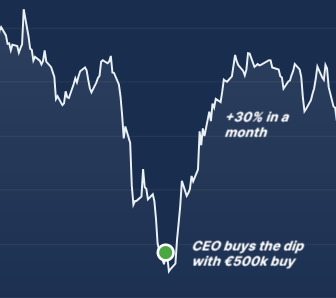Leichtes Verfolgen von Insidergeschäften über Märkte hinweg
Leistungsstarker Tracker für Insiderhandel, maßgeschneidert für Kleinanleger und professionelle Investoren
Finden Sie Aktien, die Insider kaufen und verkaufen
Überwachen Sie spezifische Unternehmen und Branchen
Erhalten Sie tägliche E-Mail-Berichte
Verwenden Sie die Screener, um ungewöhnliche Transaktionen zu identifizieren
Exportieren von Daten nach Excel im .csv- oder .xlsx-Format
Filtern Sie das Rauschen mit unserer erweiterten Suchfunktion heraus
7+ Millionen erfasste Transaktionen
12 erfasste Märkte
34.000+ verfolgte Unternehmen
15.000+ gesendete E-Mails
Transaktionen durchsuchen
Explore the latest transactions to find investment opportunities. We update the data in near-real time, so you can be sure to have the latest information.
Latest transactions
Ungewöhnliche Transaktionen aufdecken
Our algorithms detect the largest insider buys and sells each day. They also detect cluster transactions, as well as insiders buying the dip, so that you can focus on the most relevant transactions
Uncover investment opportunities in specific industries
Use our advanced search tools to focus on transactions in industries you are most interested in: biotechs, tech companies, metals & mining, etc.
Track companies and receive daily reports in your inbox
Track transactions from executives at specific companies and receive a daily email report with the last transactions from these companies and from your saved searches
Download transaction data
Download transaction data in .csv or .xlsx format. You can then use this data in your own spreadsheets or analysis tools
Letzte 90 Tage
Trending
|
|
|
|
|
|
|
|
Top-Insiderkäufe
|
|
$198.325.100 |
|
|
$94.937 |
| $430.840 | |
|
|
$3.052.501 |
|
|
$3.503.024 |
Top-Insiderverkäufe
|
|
$4.883.696 |
|
|
$2.800.509 |
|
|
$97.542.309 |
|
|
$2.113.003 |
|
|
$5.363.677 |
Käufe von mehreren Insidern
|
|
$492.277 |
|
|
$341.594 |
|
|
$726.041 |
|
|
$473.143 |
|
|
$1.794.985 |
Verkäufe von mehreren Insidern
|
|
$20.246.802 |
|
|
$9.811.979 |
| $1.953.671 | |
|
|
$5.363.677 |
| $17.276.730 |
Den Dip kaufen
|
|
-5% |
|
|
-13% |
|
|
-11% |
|
|
-6% |
|
|
-11% |
Top-Manager kauft
|
|
$162.576 |
|
|
$245.323.640 |
|
|
$15.102.305 |
|
|
$2.043.872 |
|
|
$3.432.765 |
Top-Manager verkauft
|
|
$2.113.003 |
|
|
$5.363.677 |
|
|
$10.062.634 |
|
|
$636.268 |
| $17.276.730 |
Recent earnings
|
|
heute |
|
|
heute |
|
|
heute |
|
|
heute |
|
|
heute |
Upcoming earnings
|
|
Apr 21 |
|
|
Apr 21 |
|
|
Apr 21 |
|
|
Apr 21 |
|
|
Apr 21 |
Latest transactions
| Unternehmen | K/V Art der Transaktion | Insider und/oder position |
Anz. der Aktien Kurs Wert |
Anzahl der Aktien | Kurs | Wert |
|---|---|---|---|---|---|---|
| K Kauf |
Jacques Lacroix Président du Conseild'Administration Durch COMPAGNIE FINANCIERE DE BROCELIANDE SAS, eine nahestehende Person Verwaltungsratsmitglied |
2.000
8,7019.770 EUR |
2.000 | 8,70 | 17.400 EUR | |
|
|
K Kauf |
RAPHAEL SMILA ADMINISTRATEUR Durch CLEA SMILA, eine nahestehende Person Verwaltungsratsmitglied |
67.729
0,1813.824 EUR |
67.729 | 0,18 | 12.167 EUR |
|
|
K Kauf |
RONAN LE LAN PRESIDENT DU DIRECTOIRE Verwaltungsratsmitglied |
8.853
57,12574.557 EUR |
8.853 | 57,12 | 505.683 EUR |
|
|
K Kauf |
Antoine FLAMARION Président de AF&CoManagement, elle-même Gérant de Tikehau Capital Durch TIKEHAU CAPITAL ADVISORS Société par actions simplifiée, eine nahestehende Person Geschäftsführender Verwaltungsratsmitglied |
500
18,0110.231 EUR |
500 | 18,01 | 9.005 EUR |
|
|
K Kauf |
JEAN CLAUDE JUNIOR LE LAN MEMBRE DU CONSEIL DE SURVEILLANCE Aufsichtsratsmitglied |
7.669
57,12497.716 EUR |
7.669 | 57,12 | 438.053 EUR |
Häufig gestellte Fragen
What is insider screener?
insider screener makes monitoring insider transactions easy.
Because reading through insider transactions filings published on the financial regulators' websites is a tedious task, we gather this data, analyze it and publish it so that you can find the data you need easily.
Where is the data coming from?
We gather the data directly from the financial regulators or from the stock exchanges, depending on each market.
Is insider transactions data legal?
Insider transactions data, which refers to information about the buying and selling of a company's stock by its officers, directors, and employees, is generally legal and publicly available. In many jurisdictions, companies are required to disclose insider transactions to regulatory bodies such as the Securities and Exchange Commission (SEC) in the United States or equivalent regulatory authorities in other countries.
These disclosures are intended to provide transparency and help prevent illegal insider trading.
Isn't insider trading illegal?
An insider transaction is the buying or selling of a company's securities (such as stocks or options) by individuals who have access to nonpublic information about the company, including officers, directors, and employees.
Insider transactions are legal and are not to be confused with illegal insider trading. The Securities and Exchange Commission defines illegal insider trading as "buying or selling a security, in breach of a fiduciary duty or other relationship of trust and confidence, on the basis of material, nonpublic information about the security. Insider trading violations may also include "tipping" such information, securities trading by the person "tipped," and securities trading by those who misappropriate such information."
Who qualifies as an insider?
The definition of an insider can vary slightly depending on the jurisdiction and the specific regulations in place, but generally, insiders include individuals who have access to nonpublic information about a company. The following categories of individuals are commonly considered insiders:
- Officers: This includes top executives such as the CEO (Chief Executive Officer), CFO (Chief Financial Officer), COO (Chief Operating Officer), and other high-ranking officers.
- Directors: Members of a company's board of directors are often considered insiders. This includes both executive directors (who are also officers of the company) and non-executive directors.
- Employees: Some employees, especially those in key positions or with access to sensitive information, may be classified as insiders. This can include individuals in finance, legal, research and development, and other departments.
- Major Shareholders: Individuals or entities that hold a significant percentage of a company's shares may be considered insiders, especially if they have access to nonpublic information.
























